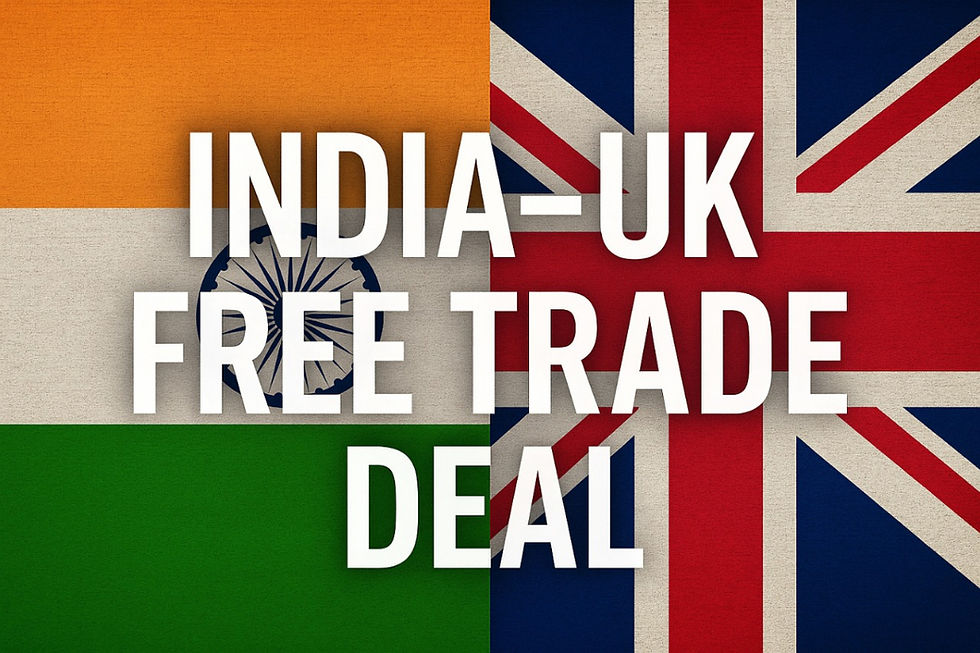India and UK Sign Historic Free Trade Agreement — What It Means for Both Countries
- Mahi C.

- Jul 28, 2025
- 4 min read

In a major moment for global trade, India and the United Kingdom have officially signed a Free Trade Agreement (FTA) — a move that is being called a “historic turning point” in the relationship between the two nations. This deal, which was signed at the UK Prime Minister’s country residence, Chequers, brings together two strong economies and lays the foundation for long-term cooperation in trade, jobs, investment, and cultural exchange.
Let’s break down what this Free Trade Agreement is all about, and why it matters so much for ordinary people, businesses, and the future of both countries.
What Is a Free Trade Agreement?
A Free Trade Agreement is a deal between two or more countries where they agree to reduce or eliminate taxes (called tariffs) on goods and services that are imported or exported. This makes it easier and cheaper for businesses to trade with each other across borders.
For example, if a UK company wants to sell its products in India, it normally has to pay a heavy tax. With this new FTA, that tax is reduced — meaning UK products will be cheaper in Indian markets, and vice versa.
The India–UK Free Trade Deal: Key Points
1. Lower Prices on Everyday Goods
Thanks to the deal, many UK-made products like whisky, cars, and clothing will become much cheaper in India. For instance:
Whisky and gin, which were taxed at over 150%, will now see taxes reduced to 75% immediately, and then gradually down to 40% over 10 years.
Luxury cars, like those from Jaguar Land Rover (a company owned by India’s Tata Group), will now face only 10% tax instead of 100%+ previously.
British chocolates, biscuits, and tea will also become more affordable for Indian buyers.
2. Indian Products Will Shine in the UK
India is known for its rich exports of textiles, spices, jewellery, and handmade goods. Under the FTA:
99% of Indian products will enter the UK without any import duty.
This will increase demand for Indian products in the UK market and help Indian businesses grow internationally.
3. Huge Boost in Trade and Jobs
The deal is expected to:
Increase trade between India and the UK by over £25 billion (₹2.6 lakh crore) annually by the year 2040.
Add £4.8 billion to the UK’s economy every year.
Create thousands of new jobs in both countries, especially in the technology, food, and education sectors.
Investment Opportunities
This agreement isn’t just about buying and selling goods. It also opens the door for big investments. Companies from both India and the UK will be encouraged to:
Start new businesses
Invest in green energy, AI, healthcare, and advanced manufacturing
Work on joint innovation projects
For example, during the signing event, over £6 billion worth of business deals were announced — including new research centres, factory setups, and clean energy initiatives.
Mobility and Visas — What's New?
One of the most talked-about points in this FTA is the mobility of skilled workers:
The UK has agreed to offer 1,800 work visas per year to Indian professionals like chefs, yoga instructors, IT experts, and artists.
This will give talented Indians a chance to work in the UK legally and contribute to its economy.
While it’s a limited number, this is a positive step toward more flexible and people-friendly immigration policies between the two countries.
Strategic Partnerships
Beyond business and trade, this FTA also strengthens ties in other important areas:
Defence and security cooperation will increase to fight terrorism and cyber threats together.
Climate change efforts will be shared through joint research and renewable energy projects.
There are even talks about cultural exchange — including cricket diplomacy!
PM Modi said, “Cricket is a metaphor for our partnership — sometimes a swing and a miss, but always played with a straight bat.”
What the Leaders Said
UK Prime Minister Keir Starmer called the deal “a historic moment” and “the most important trade agreement the UK has signed since Brexit.”
Indian Prime Minister Narendra Modi said, “This is a historic day in our bilateral relations. We are not just trading goods — we are trading trust, hope, and opportunities for our youth.”
This shows the level of political support and the long-term vision behind this agreement.
Why This Matters to You
Whether you are a student, entrepreneur, shopper, or professional, this deal could have a real impact on your life:
Students may benefit from future academic and skill exchange programs.
Shoppers in India may soon see UK goods at better prices.
Indian exporters and small businesses could find a huge new customer base in the UK.
Professionals and skilled workers could see new pathways to work abroad.
What’s Next?
The FTA has been signed, but it now needs to be approved by both countries' parliaments before it officially comes into effect. This is expected to happen in late 2025 or early 2026.
Until then, governments and businesses will start preparing for implementation, setting up infrastructure, and educating companies on how to take advantage of the agreement.
Final Thoughts
This Free Trade Agreement between India and the UK is more than just a piece of paper. It’s a reflection of mutual respect, trust, and a shared vision for the future. At a time when global politics is often divided, this deal shows that two democracies with different cultures and histories can come together for progress and prosperity.
With reduced costs, increased jobs, and stronger relationships, this deal is a win-win for both countries — and for the common citizen who may now have access to more choices, better prices, and new opportunities.




Comments